The Changing Nature of the Workplace and its Implications on Skills
VerifiedAdded on 2022/09/12
|6
|1508
|22
Report
AI Summary
This report examines the significant changes occurring in the modern workplace, driven by factors such as globalization, digital technology, and a growing emphasis on employee wellbeing. It explores the implications of these changes on required skills and management strategies. The analysis highlights the interconnectedness of global value chains, the rise of digital technologies impacting operational efficiency, and the importance of employee rights and wellbeing. The report discusses how managers should adapt to these changes by gaining knowledge of global market trends, training employees in cultural diversity and digital literacy, and leveraging technology to enhance employee conditions. The conclusion underscores the dynamic nature of the workplace and the need for managers to understand and address the challenges presented by globalization, digital advancements, and employee wellbeing to ensure organizational success. The author emphasizes strategic planning and continuous adaptation to navigate the evolving business environment effectively.
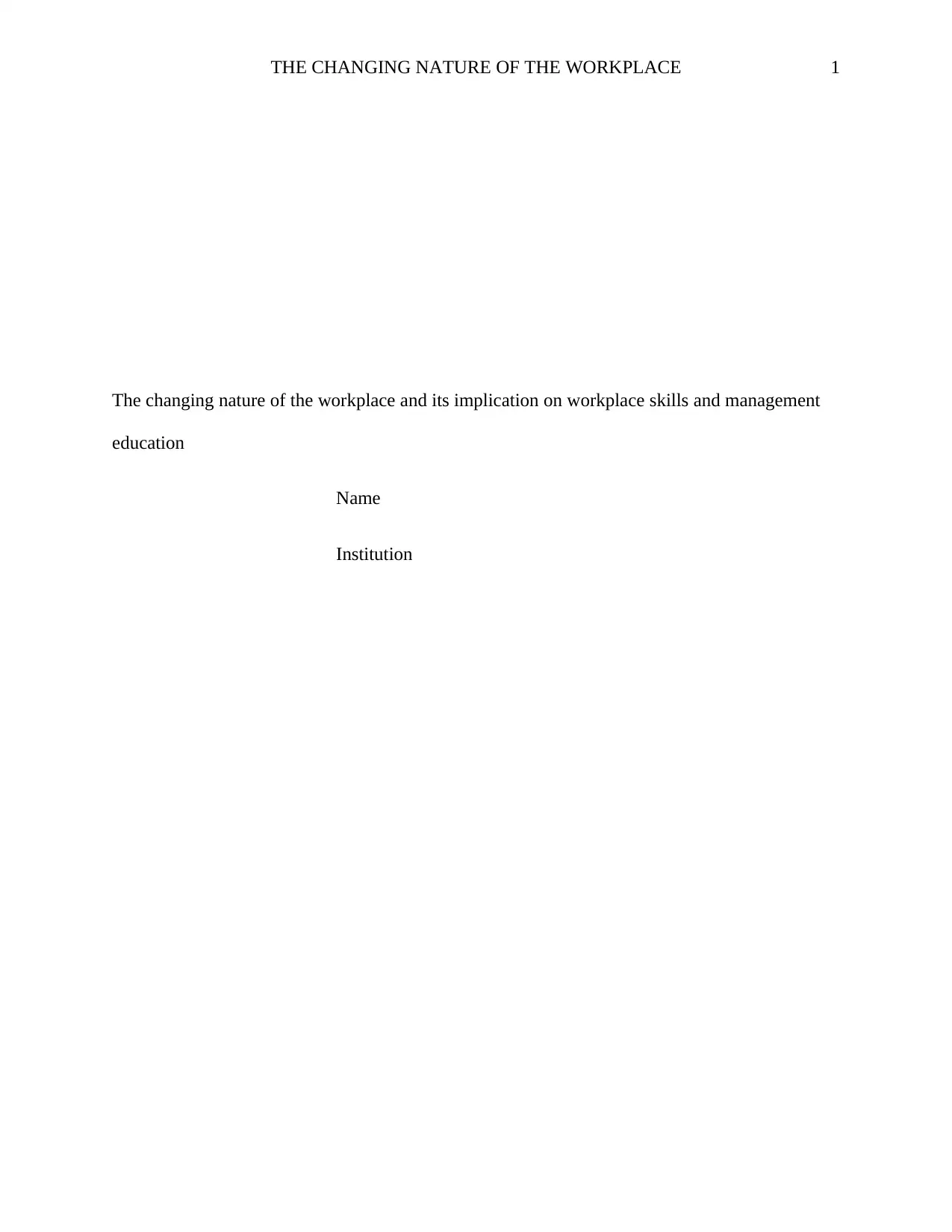
THE CHANGING NATURE OF THE WORKPLACE 1
The changing nature of the workplace and its implication on workplace skills and management
education
Name
Institution
The changing nature of the workplace and its implication on workplace skills and management
education
Name
Institution
Paraphrase This Document
Need a fresh take? Get an instant paraphrase of this document with our AI Paraphraser
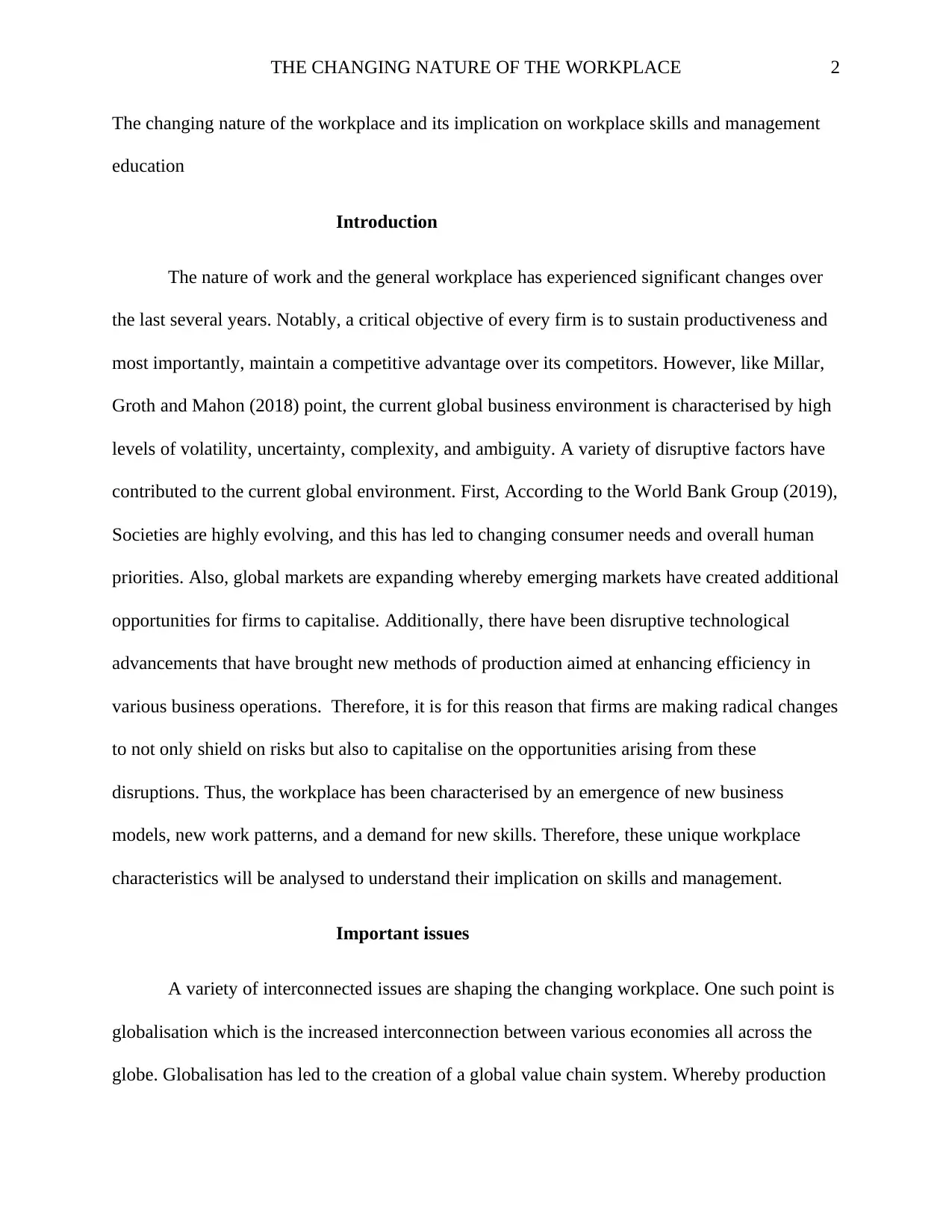
THE CHANGING NATURE OF THE WORKPLACE 2
The changing nature of the workplace and its implication on workplace skills and management
education
Introduction
The nature of work and the general workplace has experienced significant changes over
the last several years. Notably, a critical objective of every firm is to sustain productiveness and
most importantly, maintain a competitive advantage over its competitors. However, like Millar,
Groth and Mahon (2018) point, the current global business environment is characterised by high
levels of volatility, uncertainty, complexity, and ambiguity. A variety of disruptive factors have
contributed to the current global environment. First, According to the World Bank Group (2019),
Societies are highly evolving, and this has led to changing consumer needs and overall human
priorities. Also, global markets are expanding whereby emerging markets have created additional
opportunities for firms to capitalise. Additionally, there have been disruptive technological
advancements that have brought new methods of production aimed at enhancing efficiency in
various business operations. Therefore, it is for this reason that firms are making radical changes
to not only shield on risks but also to capitalise on the opportunities arising from these
disruptions. Thus, the workplace has been characterised by an emergence of new business
models, new work patterns, and a demand for new skills. Therefore, these unique workplace
characteristics will be analysed to understand their implication on skills and management.
Important issues
A variety of interconnected issues are shaping the changing workplace. One such point is
globalisation which is the increased interconnection between various economies all across the
globe. Globalisation has led to the creation of a global value chain system. Whereby production
The changing nature of the workplace and its implication on workplace skills and management
education
Introduction
The nature of work and the general workplace has experienced significant changes over
the last several years. Notably, a critical objective of every firm is to sustain productiveness and
most importantly, maintain a competitive advantage over its competitors. However, like Millar,
Groth and Mahon (2018) point, the current global business environment is characterised by high
levels of volatility, uncertainty, complexity, and ambiguity. A variety of disruptive factors have
contributed to the current global environment. First, According to the World Bank Group (2019),
Societies are highly evolving, and this has led to changing consumer needs and overall human
priorities. Also, global markets are expanding whereby emerging markets have created additional
opportunities for firms to capitalise. Additionally, there have been disruptive technological
advancements that have brought new methods of production aimed at enhancing efficiency in
various business operations. Therefore, it is for this reason that firms are making radical changes
to not only shield on risks but also to capitalise on the opportunities arising from these
disruptions. Thus, the workplace has been characterised by an emergence of new business
models, new work patterns, and a demand for new skills. Therefore, these unique workplace
characteristics will be analysed to understand their implication on skills and management.
Important issues
A variety of interconnected issues are shaping the changing workplace. One such point is
globalisation which is the increased interconnection between various economies all across the
globe. Globalisation has led to the creation of a global value chain system. Whereby production
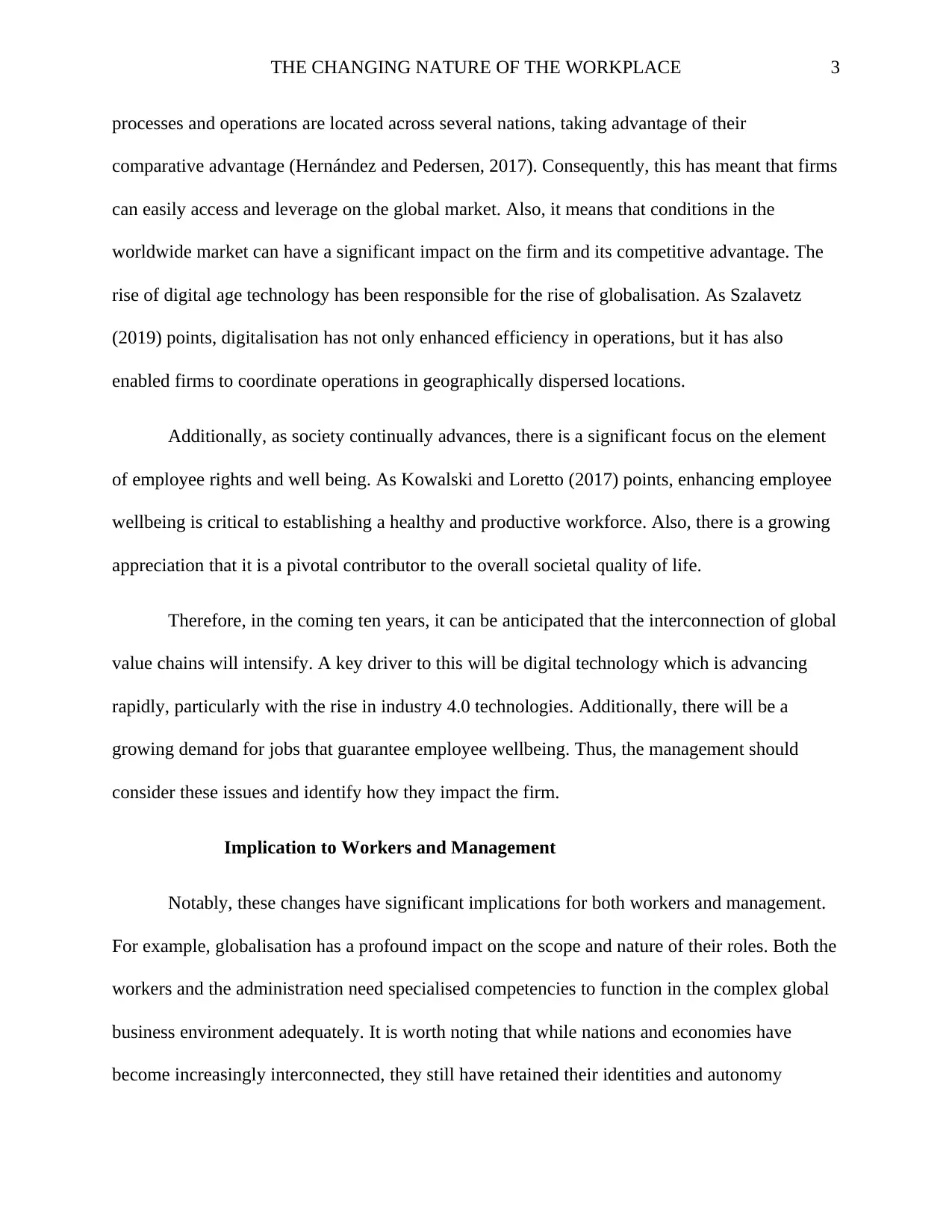
THE CHANGING NATURE OF THE WORKPLACE 3
processes and operations are located across several nations, taking advantage of their
comparative advantage (Hernández and Pedersen, 2017). Consequently, this has meant that firms
can easily access and leverage on the global market. Also, it means that conditions in the
worldwide market can have a significant impact on the firm and its competitive advantage. The
rise of digital age technology has been responsible for the rise of globalisation. As Szalavetz
(2019) points, digitalisation has not only enhanced efficiency in operations, but it has also
enabled firms to coordinate operations in geographically dispersed locations.
Additionally, as society continually advances, there is a significant focus on the element
of employee rights and well being. As Kowalski and Loretto (2017) points, enhancing employee
wellbeing is critical to establishing a healthy and productive workforce. Also, there is a growing
appreciation that it is a pivotal contributor to the overall societal quality of life.
Therefore, in the coming ten years, it can be anticipated that the interconnection of global
value chains will intensify. A key driver to this will be digital technology which is advancing
rapidly, particularly with the rise in industry 4.0 technologies. Additionally, there will be a
growing demand for jobs that guarantee employee wellbeing. Thus, the management should
consider these issues and identify how they impact the firm.
Implication to Workers and Management
Notably, these changes have significant implications for both workers and management.
For example, globalisation has a profound impact on the scope and nature of their roles. Both the
workers and the administration need specialised competencies to function in the complex global
business environment adequately. It is worth noting that while nations and economies have
become increasingly interconnected, they still have retained their identities and autonomy
processes and operations are located across several nations, taking advantage of their
comparative advantage (Hernández and Pedersen, 2017). Consequently, this has meant that firms
can easily access and leverage on the global market. Also, it means that conditions in the
worldwide market can have a significant impact on the firm and its competitive advantage. The
rise of digital age technology has been responsible for the rise of globalisation. As Szalavetz
(2019) points, digitalisation has not only enhanced efficiency in operations, but it has also
enabled firms to coordinate operations in geographically dispersed locations.
Additionally, as society continually advances, there is a significant focus on the element
of employee rights and well being. As Kowalski and Loretto (2017) points, enhancing employee
wellbeing is critical to establishing a healthy and productive workforce. Also, there is a growing
appreciation that it is a pivotal contributor to the overall societal quality of life.
Therefore, in the coming ten years, it can be anticipated that the interconnection of global
value chains will intensify. A key driver to this will be digital technology which is advancing
rapidly, particularly with the rise in industry 4.0 technologies. Additionally, there will be a
growing demand for jobs that guarantee employee wellbeing. Thus, the management should
consider these issues and identify how they impact the firm.
Implication to Workers and Management
Notably, these changes have significant implications for both workers and management.
For example, globalisation has a profound impact on the scope and nature of their roles. Both the
workers and the administration need specialised competencies to function in the complex global
business environment adequately. It is worth noting that while nations and economies have
become increasingly interconnected, they still have retained their identities and autonomy
⊘ This is a preview!⊘
Do you want full access?
Subscribe today to unlock all pages.

Trusted by 1+ million students worldwide
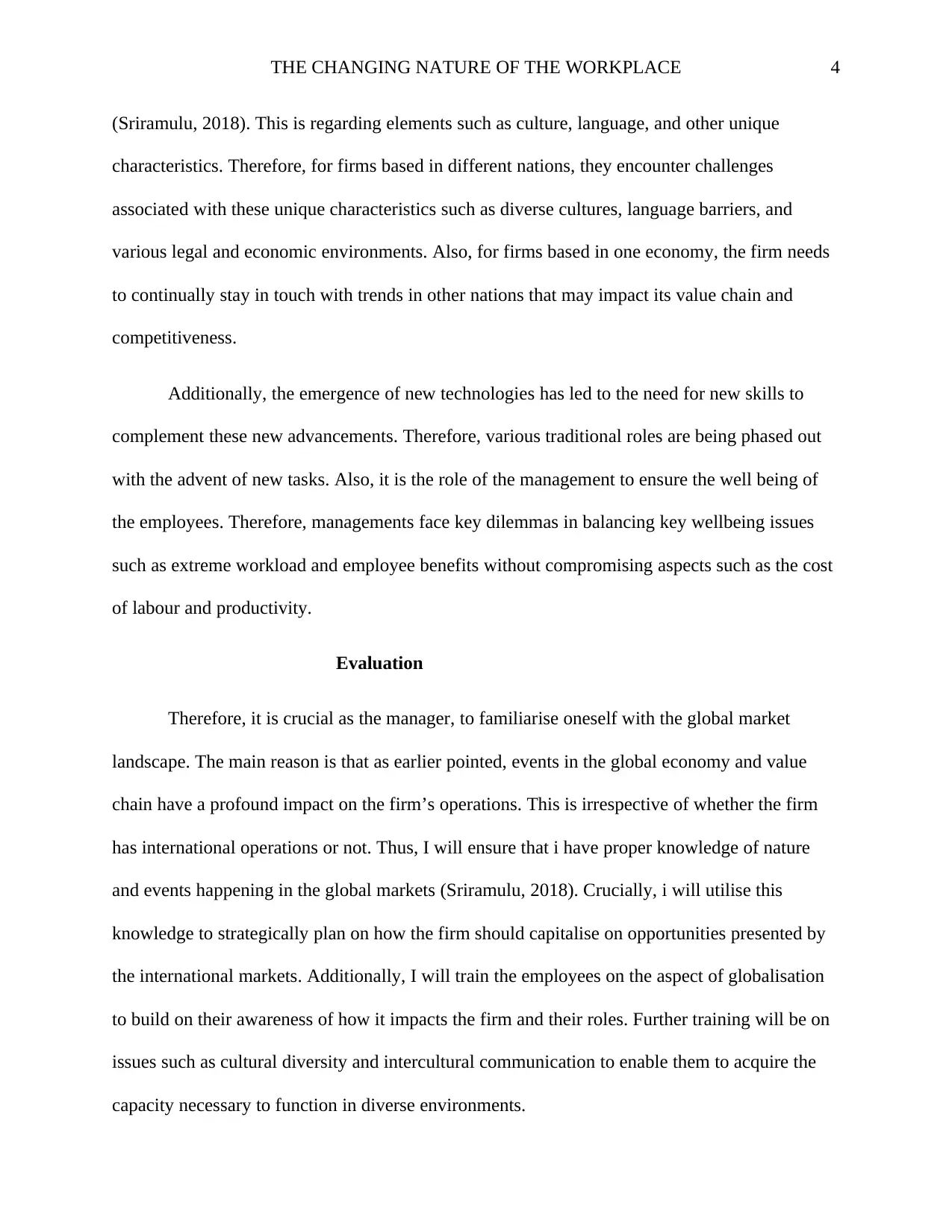
THE CHANGING NATURE OF THE WORKPLACE 4
(Sriramulu, 2018). This is regarding elements such as culture, language, and other unique
characteristics. Therefore, for firms based in different nations, they encounter challenges
associated with these unique characteristics such as diverse cultures, language barriers, and
various legal and economic environments. Also, for firms based in one economy, the firm needs
to continually stay in touch with trends in other nations that may impact its value chain and
competitiveness.
Additionally, the emergence of new technologies has led to the need for new skills to
complement these new advancements. Therefore, various traditional roles are being phased out
with the advent of new tasks. Also, it is the role of the management to ensure the well being of
the employees. Therefore, managements face key dilemmas in balancing key wellbeing issues
such as extreme workload and employee benefits without compromising aspects such as the cost
of labour and productivity.
Evaluation
Therefore, it is crucial as the manager, to familiarise oneself with the global market
landscape. The main reason is that as earlier pointed, events in the global economy and value
chain have a profound impact on the firm’s operations. This is irrespective of whether the firm
has international operations or not. Thus, I will ensure that i have proper knowledge of nature
and events happening in the global markets (Sriramulu, 2018). Crucially, i will utilise this
knowledge to strategically plan on how the firm should capitalise on opportunities presented by
the international markets. Additionally, I will train the employees on the aspect of globalisation
to build on their awareness of how it impacts the firm and their roles. Further training will be on
issues such as cultural diversity and intercultural communication to enable them to acquire the
capacity necessary to function in diverse environments.
(Sriramulu, 2018). This is regarding elements such as culture, language, and other unique
characteristics. Therefore, for firms based in different nations, they encounter challenges
associated with these unique characteristics such as diverse cultures, language barriers, and
various legal and economic environments. Also, for firms based in one economy, the firm needs
to continually stay in touch with trends in other nations that may impact its value chain and
competitiveness.
Additionally, the emergence of new technologies has led to the need for new skills to
complement these new advancements. Therefore, various traditional roles are being phased out
with the advent of new tasks. Also, it is the role of the management to ensure the well being of
the employees. Therefore, managements face key dilemmas in balancing key wellbeing issues
such as extreme workload and employee benefits without compromising aspects such as the cost
of labour and productivity.
Evaluation
Therefore, it is crucial as the manager, to familiarise oneself with the global market
landscape. The main reason is that as earlier pointed, events in the global economy and value
chain have a profound impact on the firm’s operations. This is irrespective of whether the firm
has international operations or not. Thus, I will ensure that i have proper knowledge of nature
and events happening in the global markets (Sriramulu, 2018). Crucially, i will utilise this
knowledge to strategically plan on how the firm should capitalise on opportunities presented by
the international markets. Additionally, I will train the employees on the aspect of globalisation
to build on their awareness of how it impacts the firm and their roles. Further training will be on
issues such as cultural diversity and intercultural communication to enable them to acquire the
capacity necessary to function in diverse environments.
Paraphrase This Document
Need a fresh take? Get an instant paraphrase of this document with our AI Paraphraser
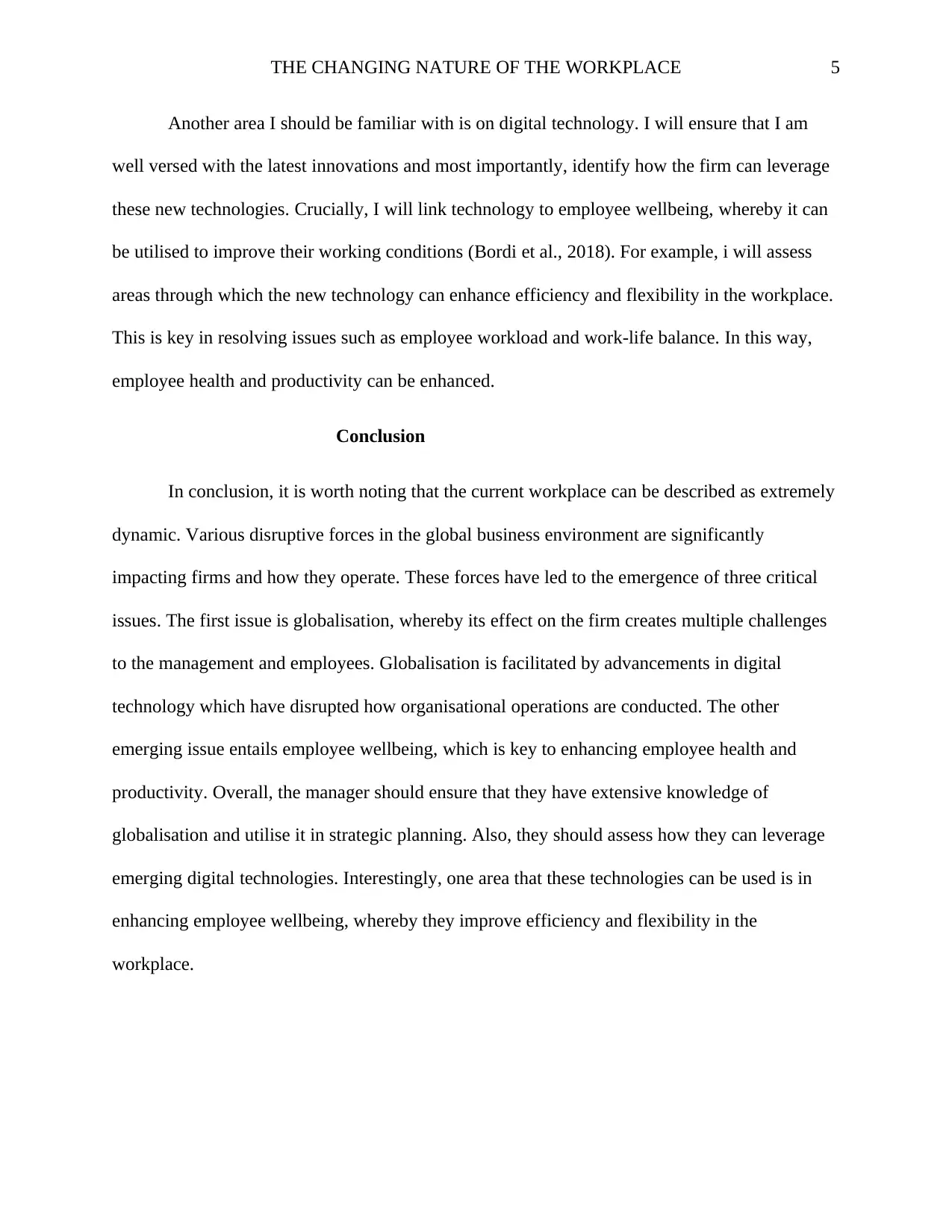
THE CHANGING NATURE OF THE WORKPLACE 5
Another area I should be familiar with is on digital technology. I will ensure that I am
well versed with the latest innovations and most importantly, identify how the firm can leverage
these new technologies. Crucially, I will link technology to employee wellbeing, whereby it can
be utilised to improve their working conditions (Bordi et al., 2018). For example, i will assess
areas through which the new technology can enhance efficiency and flexibility in the workplace.
This is key in resolving issues such as employee workload and work-life balance. In this way,
employee health and productivity can be enhanced.
Conclusion
In conclusion, it is worth noting that the current workplace can be described as extremely
dynamic. Various disruptive forces in the global business environment are significantly
impacting firms and how they operate. These forces have led to the emergence of three critical
issues. The first issue is globalisation, whereby its effect on the firm creates multiple challenges
to the management and employees. Globalisation is facilitated by advancements in digital
technology which have disrupted how organisational operations are conducted. The other
emerging issue entails employee wellbeing, which is key to enhancing employee health and
productivity. Overall, the manager should ensure that they have extensive knowledge of
globalisation and utilise it in strategic planning. Also, they should assess how they can leverage
emerging digital technologies. Interestingly, one area that these technologies can be used is in
enhancing employee wellbeing, whereby they improve efficiency and flexibility in the
workplace.
Another area I should be familiar with is on digital technology. I will ensure that I am
well versed with the latest innovations and most importantly, identify how the firm can leverage
these new technologies. Crucially, I will link technology to employee wellbeing, whereby it can
be utilised to improve their working conditions (Bordi et al., 2018). For example, i will assess
areas through which the new technology can enhance efficiency and flexibility in the workplace.
This is key in resolving issues such as employee workload and work-life balance. In this way,
employee health and productivity can be enhanced.
Conclusion
In conclusion, it is worth noting that the current workplace can be described as extremely
dynamic. Various disruptive forces in the global business environment are significantly
impacting firms and how they operate. These forces have led to the emergence of three critical
issues. The first issue is globalisation, whereby its effect on the firm creates multiple challenges
to the management and employees. Globalisation is facilitated by advancements in digital
technology which have disrupted how organisational operations are conducted. The other
emerging issue entails employee wellbeing, which is key to enhancing employee health and
productivity. Overall, the manager should ensure that they have extensive knowledge of
globalisation and utilise it in strategic planning. Also, they should assess how they can leverage
emerging digital technologies. Interestingly, one area that these technologies can be used is in
enhancing employee wellbeing, whereby they improve efficiency and flexibility in the
workplace.
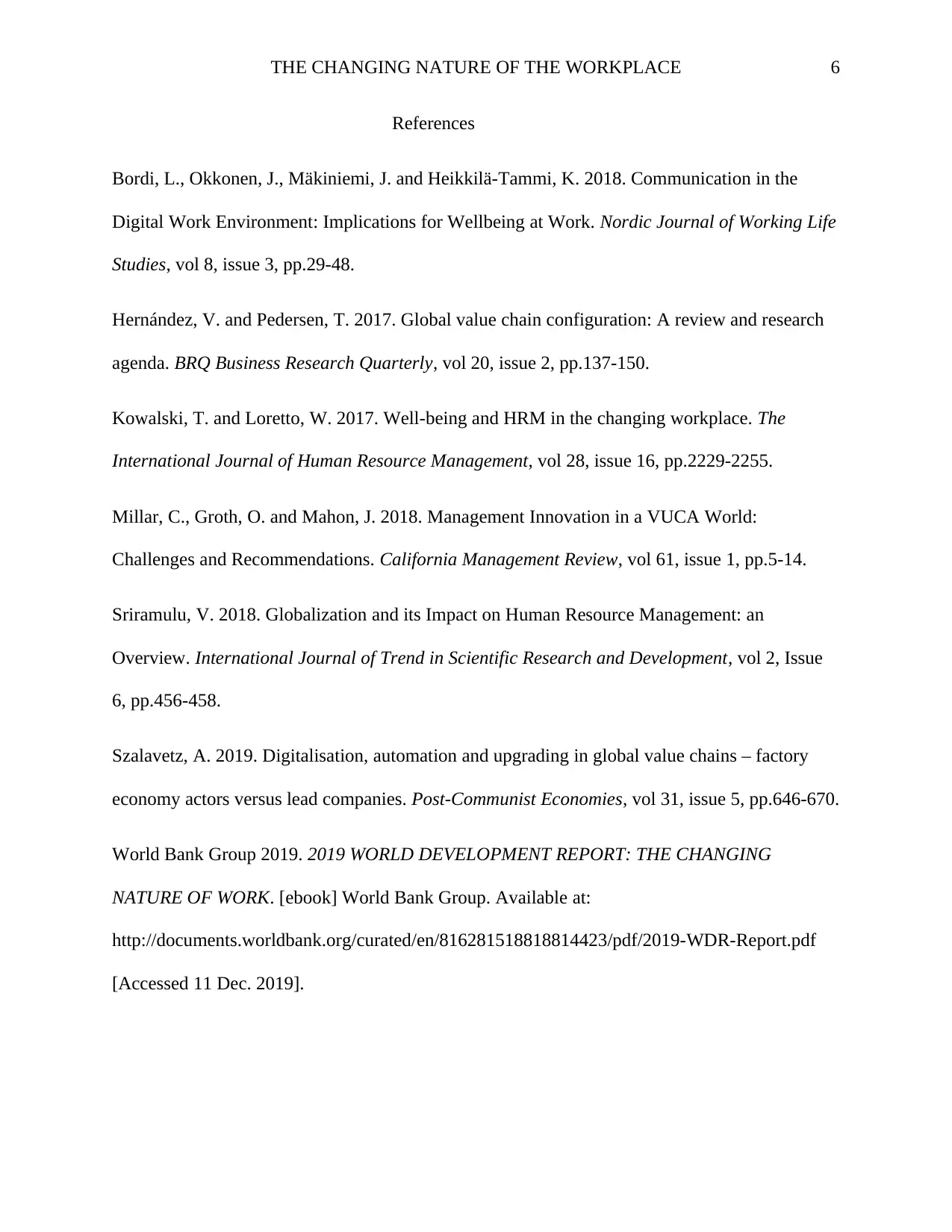
THE CHANGING NATURE OF THE WORKPLACE 6
References
Bordi, L., Okkonen, J., Mäkiniemi, J. and Heikkilä-Tammi, K. 2018. Communication in the
Digital Work Environment: Implications for Wellbeing at Work. Nordic Journal of Working Life
Studies, vol 8, issue 3, pp.29-48.
Hernández, V. and Pedersen, T. 2017. Global value chain configuration: A review and research
agenda. BRQ Business Research Quarterly, vol 20, issue 2, pp.137-150.
Kowalski, T. and Loretto, W. 2017. Well-being and HRM in the changing workplace. The
International Journal of Human Resource Management, vol 28, issue 16, pp.2229-2255.
Millar, C., Groth, O. and Mahon, J. 2018. Management Innovation in a VUCA World:
Challenges and Recommendations. California Management Review, vol 61, issue 1, pp.5-14.
Sriramulu, V. 2018. Globalization and its Impact on Human Resource Management: an
Overview. International Journal of Trend in Scientific Research and Development, vol 2, Issue
6, pp.456-458.
Szalavetz, A. 2019. Digitalisation, automation and upgrading in global value chains – factory
economy actors versus lead companies. Post-Communist Economies, vol 31, issue 5, pp.646-670.
World Bank Group 2019. 2019 WORLD DEVELOPMENT REPORT: THE CHANGING
NATURE OF WORK. [ebook] World Bank Group. Available at:
http://documents.worldbank.org/curated/en/816281518818814423/pdf/2019-WDR-Report.pdf
[Accessed 11 Dec. 2019].
References
Bordi, L., Okkonen, J., Mäkiniemi, J. and Heikkilä-Tammi, K. 2018. Communication in the
Digital Work Environment: Implications for Wellbeing at Work. Nordic Journal of Working Life
Studies, vol 8, issue 3, pp.29-48.
Hernández, V. and Pedersen, T. 2017. Global value chain configuration: A review and research
agenda. BRQ Business Research Quarterly, vol 20, issue 2, pp.137-150.
Kowalski, T. and Loretto, W. 2017. Well-being and HRM in the changing workplace. The
International Journal of Human Resource Management, vol 28, issue 16, pp.2229-2255.
Millar, C., Groth, O. and Mahon, J. 2018. Management Innovation in a VUCA World:
Challenges and Recommendations. California Management Review, vol 61, issue 1, pp.5-14.
Sriramulu, V. 2018. Globalization and its Impact on Human Resource Management: an
Overview. International Journal of Trend in Scientific Research and Development, vol 2, Issue
6, pp.456-458.
Szalavetz, A. 2019. Digitalisation, automation and upgrading in global value chains – factory
economy actors versus lead companies. Post-Communist Economies, vol 31, issue 5, pp.646-670.
World Bank Group 2019. 2019 WORLD DEVELOPMENT REPORT: THE CHANGING
NATURE OF WORK. [ebook] World Bank Group. Available at:
http://documents.worldbank.org/curated/en/816281518818814423/pdf/2019-WDR-Report.pdf
[Accessed 11 Dec. 2019].
⊘ This is a preview!⊘
Do you want full access?
Subscribe today to unlock all pages.

Trusted by 1+ million students worldwide
1 out of 6
Related Documents
Your All-in-One AI-Powered Toolkit for Academic Success.
+13062052269
info@desklib.com
Available 24*7 on WhatsApp / Email
![[object Object]](/_next/static/media/star-bottom.7253800d.svg)
Unlock your academic potential
Copyright © 2020–2026 A2Z Services. All Rights Reserved. Developed and managed by ZUCOL.




